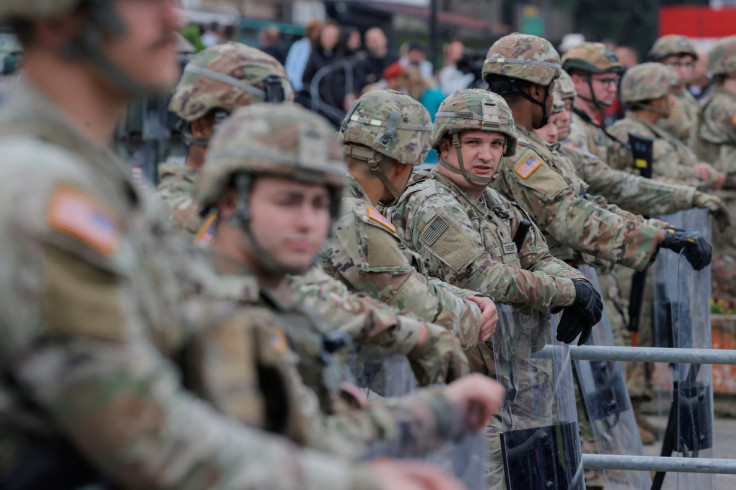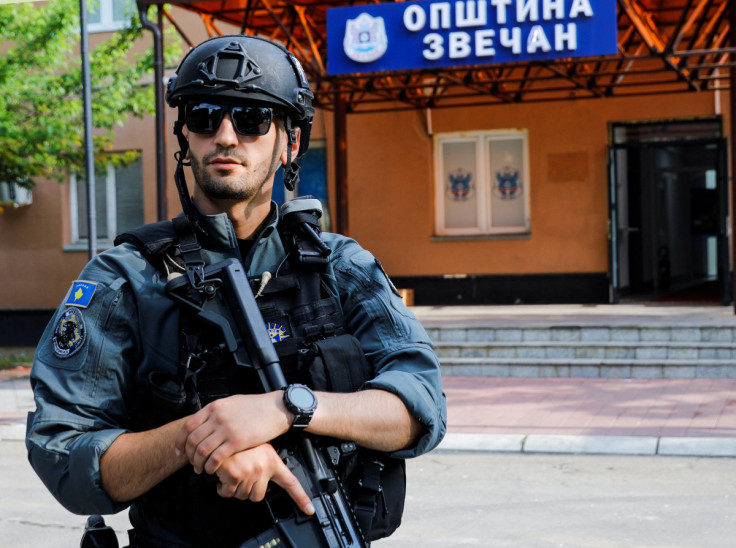NATO Soldiers Deploy Around Kosovo Town Halls In Standoff With Serb Protesters

NATO peacekeeping soldiers formed security cordons around three town halls in Kosovo on Monday to keep back Serbs protesting at ethnic Albanian mayors taking office in a Serb majority area after elections they boycotted.
In Zvecan, one of the towns, Kosovo state police - staffed entirely by ethnic Albanians after all Serbs quit the force last year - sprayed pepper gas to repel a crowd of Serbs who broke through a security barricade and tried to force their way into the municipality building, witnesses said.
In Leposavic, close to the border with Serbia, U.S. peacekeeping troops in anti-riot gear placed barbed wire around the municipality building to protect it from hundreds of angry Serbs gathering nearby.
Later in the day protesters pelted a nearby parked car belonging to the new Leposavic mayor with eggs.
NATO peacekeepers also blocked off the town hall in Zubin Potok to protect it from angry local Serbs, witnesses said.
Igor Simic, deputy head of the Serb List, the biggest Belgrade-backed Kosovo Serb party, accused Kosovo Prime Minister Albin Kurti of fuelling tensions in the north.
"We are interested in peace. Albanians who live here are interested in peace, and only he (Kurti) wants to make chaos," Simic told reporters in Zvecan, speaking in English.
Serbs, who comprise a majority in Kosovo's north, have never accepted its 2008 declaration of independence from Serbia and still see Belgrade as their capital more than two decades after the Kosovo Albanian uprising against repressive Serbian rule.
Ethnic Albanians make up more than 90% of the population in Kosovo as a whole, but northern Serbs have long demanded the implementation of an EU-brokered 2013 deal for the creation of an association of autonomous municipalities in their area.
Serbs refused to take part in local elections in April and ethnic Albanian candidates won the mayoralties in four Serb-majority municipalities - including North Mitrovica, where no incidents were reported on Monday - with a 3.5% turnout.
Serbs demand that the Kosovo government remove ethnic Albanian mayors from town halls and allow local administrations financed by Belgrade return to their duties.
On Friday, three out of four mayors were escorted into their offices by police, who were pelted with rocks and responded with tear gas and water cannon to disperse the protesters.
The United States and its allies, who have strongly backed Kosovo's independence, rebuked Pristina on Friday, saying imposing mayors in Serb-majority areas without popular support undercut efforts to normalise relations.
Kurti defended Pristina's position, tweeting after a weekend phone call with the EU's foreign policy chief: "Emphasized that elected mayors will provide services to all citizens."
Serbian Foreign Minister Ivica Dacic told RTS state television it was "not possible to have mayors who have not been elected by Serbs in Serb-majority municipalities".
Jeffrey Hovenier, the U.S. ambassador to Kosovo, met with President Vjosa Osmani and two of the new mayors on Monday and told reporters afterward: "I shared the concern about the prospect of violence and the need to de-escalate."

© Copyright Thomson Reuters 2024. All rights reserved.





















